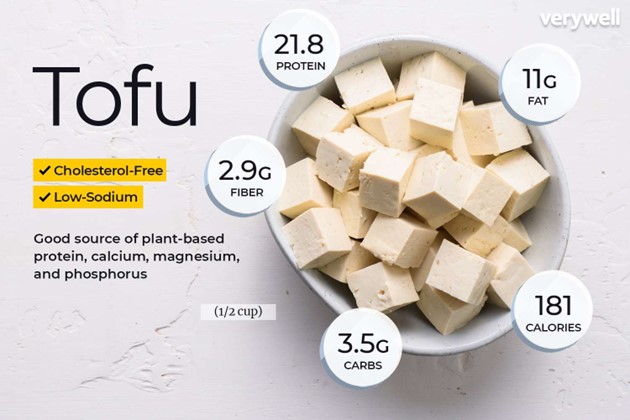A nurse is caring for a client who is at 12 weeks of gestation and is prescribed a high-protein diet. Which of the following foods should the nurse recommend as containing the highest amount of protein?
One cup of oatmeal.
One cup of tofu.
One cup of brown rice.
One cup of kale.
The Correct Answer is B
Choice A reason:
One cup of oatmeal - Oatmeal is a nutritious food, but it does not contain as high a protein content as some other options. While it offers some protein, it is not the best choice for a high-protein diet during pregnancy. Oatmeal is primarily known for its fiber content and complex carbohydrates, which provide sustained energy.
Choice B reason:
 One cup of tofu - Tofu is an excellent source of protein and is a suitable choice for a high- protein diet during pregnancy. Tofu is made from soybeans and is rich in plant-based proteins, making it an ideal option for individuals following a vegetarian or vegan diet as well. Additionally, tofu contains essential amino acids, iron, calcium, and other nutrients beneficial for both the mother and the developing fetus.
One cup of tofu - Tofu is an excellent source of protein and is a suitable choice for a high- protein diet during pregnancy. Tofu is made from soybeans and is rich in plant-based proteins, making it an ideal option for individuals following a vegetarian or vegan diet as well. Additionally, tofu contains essential amino acids, iron, calcium, and other nutrients beneficial for both the mother and the developing fetus.
Choice C reason:
One cup of brown rice - While brown rice is a healthy whole grain and provides some protein, it does not have as high a protein content as tofu. Brown rice is a good source of complex carbohydrates, fiber, vitamins, and minerals, but it may not meet the high protein requirements of a pregnant woman's diet.
Choice D reason:
One cup of kale - Kale is a nutritious leafy green vegetable, but it does not offer a significant amount of protein compared to tofu. It is rich in vitamins, minerals, and antioxidants, making it a valuable addition to a balanced diet. However, for a high-protein diet during pregnancy, other options like tofu are more suitable.
Nursing Test Bank
Naxlex Comprehensive Predictor Exams
Related Questions
Correct Answer is C
Explanation
Choice C reason: The infant makes babbling sounds. At 6 months of age, it is typical for infants to engage in babbling sounds. Babbling is a significant milestone in language development during infancy. It involves the repetition of consonant-vowel combinations (e.g., "ba-ba,”. "ma-ma") and is an essential precursor to later language skills, such as forming words and sentences. The nurse should expect the 6-month-old infant to be making these babbling sounds as part of their normal development.
Choice A reason:
The infant has a pincer grasp. A pincer grasp is the ability to pick up small objects using the thumb and index finger. This fine motor skill typically develops around 9 to 12 months of age. At 6 months old, infants have not yet acquired the pincer grasp. Therefore, the nurse should not expect the 6-month-old infant to demonstrate this skill during the assessment.
Choice D reason:
The infant crawls on their hands and knees. Crawling is a gross motor skill that usually emerges between 7 to 10 months of age. While some infants may start crawling earlier or later, it is not a skill that is typically present in a 6-month-old. Therefore, the nurse should not anticipate the 6-month-old infant to be crawling on their hands and knees during the assessment.
Choice B reason:
The infant drops objects with the expectation of someone picking them up. This behavior, known as "object permanence,”. is a cognitive milestone that develops around 8 to 12 months of age. At 6 months old, infants have not yet fully developed this concept. They might drop objects as part of their exploratory behavior, but they do not yet understand the expectation of someone picking them up. Therefore, the nurse should not expect the 6- month-old infant to exhibit this specific behavior during the assessment.
Correct Answer is D
Explanation
Swaddle the newborn during the treatment. Choice A reason:
Apply lotion to the newborn's skin twice per day. Rationale: The nurse should not apply lotion to the newborn's skin during phototherapy. Phototherapy involves exposing the baby's skin to light to treat hyperbilirubinemia. Applying lotion may interfere with the effectiveness of the treatment or cause adverse reactions.
Choice B reason:
Check the newborn's blood glucose every 2 hours. Rationale: While monitoring the newborn's blood glucose is an essential part of neonatal care, it is not directly related to phototherapy or the treatment of hyperbilirubinemia. Glucose monitoring is typically done to assess for hypoglycemia or other metabolic disturbances.
Choice C reason:
Swaddle the newborn during the treatment. Rationale: The newborn should not be swaddled during phototherapy because it limits exposure of the skin to the phototherapy lights, which is essential for reducing bilirubin levels.
Choice D reason:
Remove the newborn's eye mask during feedings. Rationale:The eye mask is used to protect the newborn's eyes from the bright lights during phototherapy, but it can be removed for feeding. It’s important to ensure that the newborn is fed properly, so removing the mask during feeding is a reasonable and necessary intervention.
Whether you are a student looking to ace your exams or a practicing nurse seeking to enhance your expertise , our nursing education contents will empower you with the confidence and competence to make a difference in the lives of patients and become a respected leader in the healthcare field.
Visit Naxlex, invest in your future and unlock endless possibilities with our unparalleled nursing education contents today
Report Wrong Answer on the Current Question
Do you disagree with the answer? If yes, what is your expected answer? Explain.
Kindly be descriptive with the issue you are facing.
